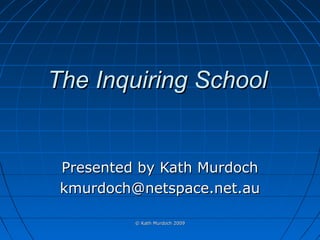More Related Content
Similar to Kath Murdoch Parent Coffee ISM Sep 2013 (20)
Kath Murdoch Parent Coffee ISM Sep 2013
- 2. What IS inquiry learning?
Inquiry is an approach to learning that in essence, involves
students in the investigation of
questions/problems/issues of significance. Through inquiry,
we seek to develop students’ competencies as skilled
learners and equip them with a set of transferable skills
and dispositions. Inquiry is an active, learner and
learning centred methodology which aims to develop deep
understanding - not surface ‘coverage’. This inquiry
model is also integrative in nature - linking learning
across disciplines.
© Kath Murdoch 2009
- 3. In an inquiring classroom
Teachers help students come to
understand themselves as learners.
Students are aware of what they are
‘doing’ as learners and how they can
improve their learning.
© Kath Murdoch 2009
- 4. The inquiring classroom
Using inquiry
across the
curriculum - as a
‘way of being’ in
the classroom
Designing
focussed, sustained
units of inquiry
© Kath Murdoch 2009
- 5. So….a school is an
‘inquiry school’…
What’s going on? What would
you expect? What are teachers
doing? What are kids doing?
What do you see and hear?
© Kath Murdoch 2009
- 6. It’s not a recipe….
Each school’s needs are different. There is no one
kind of ‘map’ that will suit all schools.
Factors determining the nature of whole school
plans include: size of school, community profile,
stability of staff, confidence with inquiry, existing
curriculum and resources.
© Kath Murdoch 2009
- 7. What does it mean to be
an inquiring school?
What are the features?
What’s the evidence?
How do we get there?
© Kath Murdoch 2009
- 8. In an inquiring school…
Students work as investigators. They are actively
involved in their learning. Their learning is driven
by rich questions and, in exploring these
questions, students’ develop a rigorous set of
skills and understandings. Students are highly
engaged and knowledgeable about learning and
about themselves as learners.
© Kath Murdoch 2009
- 9. In an inquiring school
Teachers see themselves as learners. They are
continuously inquiring into their practice and
work collaboratively to deepen their
understanding of teaching and learning.
Teachers see students as active, capable
learners and seek to build the knowledge, skills
and dispositions that enable students to become
increasingly independent.
© Kath Murdoch 2009
- 10. Student Voice
1. Students’ voices are included in planning.
Students influence the direction of their learning.
This happens both at whole school planning level
(topic selection) and within the units themselves.
Students do not always learn about the same
thing at the same time
© Kath Murdoch 2009
- 11. Big Picture
2. There is a shared,’ big picture’ framework
guiding the inquiry program – not just “topics”.
Teachers are aware of the broader conceptual
threads that underpin inquiries from P-6 and
these are discussed in planning. Ideally, students
are also introduced to these broad themes.
Whilst the conceptual basis is defined, not all foci
for inquiry are predetermined.
© Kath Murdoch 2009
- 12. Learning to Learn
3. Over P-6 students develop a set of generic
skills and strategies they can transfer across
contexts. There is a clear focus on learning to
learn. Students and teachers are conscious of the
‘tool kit’ they are developing as they move
through a unit, a year and 7 years of inquiry.
© Kath Murdoch 2009
- 13. Community Links
4. Inquiries are often linked to real issues in the
local and global community. Learning contexts
are authentic and purposeful. The actions
students undertake focus on ‘making a difference’
to themselves and their community (local and
global). The inquiries have meaning within the
context of that school.
© Kath Murdoch 2009
- 14. The human mind is better equipped to
gather information about the world by
operating within it than by reading
about it, hearing lectures on it, or
studying abstract models of it.
Abott and Ryan, 1999
© Kath Murdoch 2009
- 15. Collaborative Planning
5. Teachers plan collaboratively and in an ongoing,
reflective way. They meet regularly to consider
how the inquiry needs to continue according to
the needs and interests of the students
themselves as well as planned intentions.
Planning is recursive and ongoing.
© Kath Murdoch 2009
- 16. A model for inquiry based planning
© Kath Murdoch 2009
- 18. Understanding of Inquiry
6. Students have a clear understanding of the
process of inquiry itself and the tools and
strategies available to them as investigators.
They can explain and apply it. The process is
visually available to students and they have
opportunities to demonstrate their understanding
of it. Teaching is explicit.
© Kath Murdoch 2009
- 19. Integration of curriculum
7. The curriculum is often integrated through
inquiry. Strong connections are made between
learning areas. Teachers plan with a view to
helping students see the way learning is
connected. The timetable is not fragmented and
piecemeal. Inquiry is a methodology used across
the day - not just in “units”
© Kath Murdoch 2009
- 20. Quality classroom practice
8. Classroom practice is student-centred.
Teaching promotes self management,
collaboration and higher order thinking. Teachers
have a repertoire of methodologies for working
with students. Individual and small group
teaching is the norm. Teachers know how to
engage students in investigation and higher order
thinking.
© Kath Murdoch 2009
